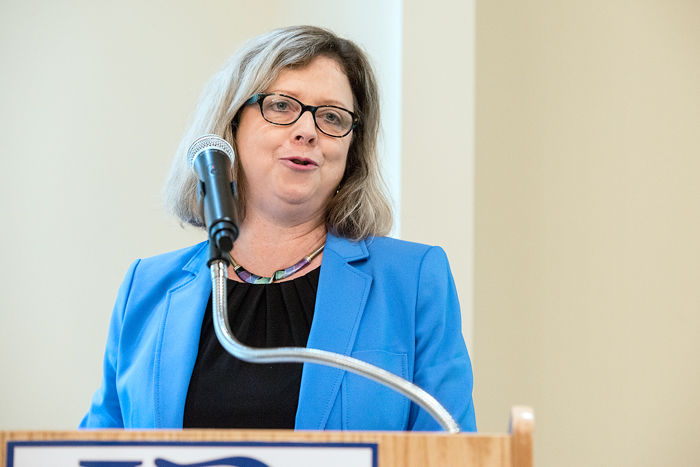One school offers the continent’s first graduate-level program in restorative justice. Another just started a new master’s program for athletic training, and a third has added two health care courses to help prepare area residents for good jobs.
Another is educating many locals who hold down jobs while enhancing their skills. And the largest of them all is striving to be the model of an engaged university.
The heads of James Madison, Eastern Mennonite and American National universities, and Bridgewater College and Blue Ridge Community College updated about 65 business leaders Tuesday morning about what’s going on at their campuses during the annual Presidential Address, hosted by the Harrisonburg-Rockingham Chamber of Commerce.
She said 98 percent of her university’s 2017 graduates are employed, headed to graduate school or serving in volunteer roles. All of EMU’s nursing graduates have jobs, as do nearly all of its teachers.
“Parents and prospective students understandably ask us, ‘If I come to EMU, will I get a good job when I graduate?’” Huxman related to the crowd. “Our data strongly suggests that they will. That is a testament to our superb faculty, the kinds of students we recruit, and the receptive economy, especially from employers right here in the Valley.”
The university’s first group of students to earn a master’s degree in restorative justice, which she said is the only such program in North America, graduated last spring, and graduate programs in counseling, biomedicine and organizational leadership “are going gangbusters.”
EMU celebrates its centennial this year, and it will launch a doctoral program in nursing, its first at the doctoral level.
Changing With Times
Bridgewater College, President David Bushman said, began a master’s program in June when it began providing graduate-level instruction in athletic training.
While that’s a first for a school that had only offered bachelor’s degrees, Bushman said it won’t be the last. Based on market research, the college is looking closely at starting graduate programs in digital media management, cybersecurity and other fields.
The move has raised questions from some about whether Bridgewater is trying to become the region’s next JMU, but he said it’s more a matter of changing with the times.
“Our mission is to serve the students in a way that’s consistent, that prepares them for the world beyond college,” Bushman said. “And while that had been historically a baccalaureate degree in many, many fields, it’s now at least a master’s level.
“So, in fact, we’re not changing our mission. We’re reaffirming our mission and making it responsive for the students who are here today.”
Along that line, he said freshmen coming to campus this month to be part of a student body of about 1,900 should be able to study in a new library by the time they graduate. Instead of being a book warehouse, the new John Kenny Forrer Learning Commons will be “a workshop for learning,” he said.
Wandile Maseko, director of American National University’s local campus, highlighted new health care programs the for-profit institution has launched. The phlebotomy and electrocardiogram technology programs, he said, already are the school’s most popular.
ANU focuses on health care, business and information technology classes, he said. To that end, it’s also added a certificate program for medical assistants with credits transferable to an associate degree program.
“If you know anything about the for-profit educational sector,” said Maseko, “you know that a lot of institutions have closed or are in the process of shutting their doors. ANU is still here, and we remain committed to our students and this community.”
Learning Differently
Of the institutions represented at the breakfast, President John Downey made the point that Blue Ridge Community College probably is as much a part of the community’s fabric as any.
Often, he noted, local workers are BRCC students. Eighty-two percent of those taking courses for credit are part-time students.
“Almost all of them are working in your local businesses,” Downey said, “taking advantage of the salaries you provide while they’re struggling to get an education at the same time.”
Nearly 5,600 people took classes for credit last year, he said. Another 3,000 to 4,000 took noncredit courses for workforce training.
While BRCC is trying to meet the demands of some of the local workforce, James Madison University has a broader reach and is growing in other high-demand areas.
President Jonathan Alger said science, technology, engineering, math, health care, cybersecurity and intelligence analysis are in-demand fields, as is education, a JMU staple since its founding.
But learning, he said, is moving beyond memorization and even off campus. It’s part of JMU’s effort to be “the national model for the engaged university,” which takes three forms, he said.
One is engaged learning, which seeks to transform the way students think and learn. Alger said in every discipline, JMU is trying to get students involved in critical thinking, ethical reasoning, teamwork, leadership, problem-solving, resilience, and written and oral communication.
A second is community engagement. Whether it’s operating the Gus Bus, an early childhood literacy effort; offering the Valley Scholars program, which gives select area children who would be first-generation college students mentoring and offers them a full scholarship if they maintain certain grades; or the Block Party in the ’Burg, an annual pilgrimage to downtown Harrisonburg to introduce students to local businesses, Alger said JMU wants its students making a difference.
There’s also civic engagement, which Alger said tries to impress upon students “their responsibilities as citizens.”
This year, he said, Madison begins hosting the newly created Virginia chapter of Campus Compact. The national organization works to encourage community and civic engagement on all college and university campuses.
